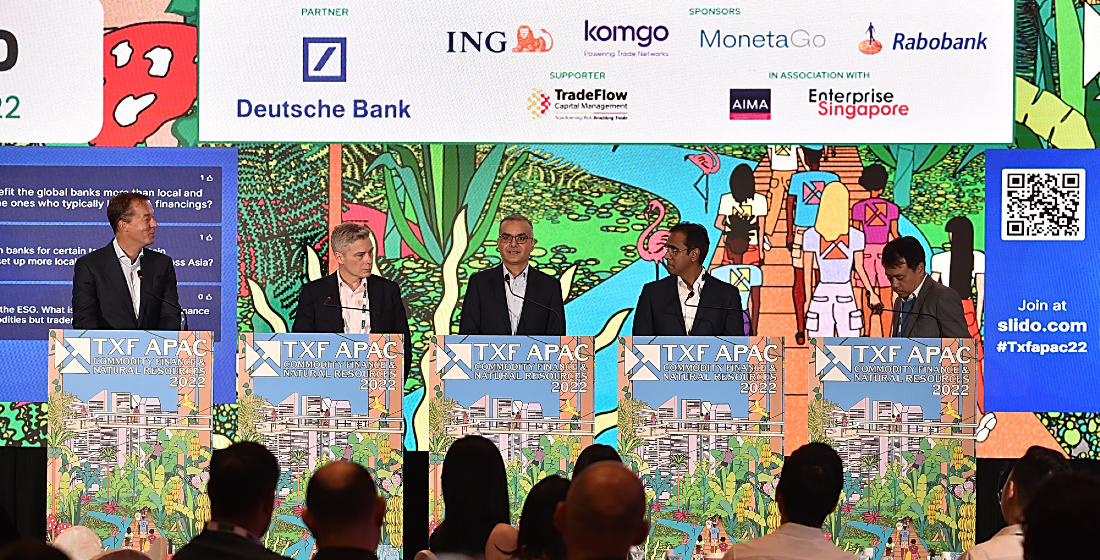TXF APAC Commodities and natural resources: Top takeaways
Back in physical format for the first time since 2019, TXF APAC opened the floor to a day of long-awaited and lively discussions. Here are this years top takeaways.

After a three-year physical hiatus, on 15th September, TXF APAC: Commodity Finance and Natural Resources finally returned to Singapore’s Sentosa Island.
In the midst of four hours of extended networking breaks, ice breaker drinks on the eve of the event and a cocktail reception following the main day of content, delegates enjoyed keynote trader and financing panels, a debut crash course on carbon credit trading, a presentation on Singapore as a hub for African trade flows, an alternative financing session focussing on how new investors can be attracted to the space, and much more!
On the corporate side, we heard from speakers from Shell Eastern Trading, Olam, Novum Energy, Trafigura, Freepoint commodities, Czarnikow, and Valency International, and from the financial institution space, speakers included ING, Rabobank, Deutsche Bank, DBS, SMBC, Santander, Tradeflow, Eastvine Capital, Blackstone & Gold, and AIMA, and more.
Welcoming familiar faces, alongside a whole host of new ones, here are the top takeaways:
Crash course on carbon
Whilst very few people in the room at TXF APAC considered themselves carbon credit trading experts, it’s an area that is thought to have huge potential to be the next hot commodity and is certainly something that the industry is keen to learn more about.
During the crash course on carbon, delegates were walked through the difference between the compliance markets, which are regulated by governments, and the voluntary markets, which have really taken off in relation to corporate’s commitments to net zero.
Panellists explained that there are many complexities associated with the voluntary market, such as different specifications that trade at different prices, and issues related to transparency and integrity. However, there are some mitigators in place such as placing a lock on the first flow of credits from a project to ensure a developer has not double sold the units, and third-party verification.
Digitisation to fight fraud relies on interoperability
The general consensus on digitisation to fight fraud in the commodities market was that it is not sole solution, but as something that can provide industry participants with the tools to mitigate risks, implementation must be encouraged by both banks and traders. Digitization provides a level of confidence in the industry, which is vital when ensuring adequate liquidity in the space.
When it comes to implementing digital solutions to fight fraud, the most important factor is interoperability between platforms, because without collaboration, it cannot succeed. In terms of where the responsibility lies, it is up to not just governments, but also private participants, to set the standard that digital solutions must be implemented.
Supply chain resilience is all about agility and education
Those who have the ability to be agile within their supply chains, and react quickly to government policy changes have the best chance of survival against supply chain disruption.
Although banks need to do more to support their borrowers, supply chain managers also have a central role to play in educating banks on new trade flows, changes to supply chains, and warehouse capacities. The more familiar and comfortable that banks are with their borrower’s trade flows and processes, the more they can adequately support global trade.
New investor appetite is changing
To gain confidence and trust from new investors, funds view being transparent about their business models and processes, and providing clarity when explaining the risks involved in a fund’s specific strategy as the most important factors.
Family offices who had previously seen ESG as a box ticking exercise have now shifted to valuing ESG at a more similar importance to returns, could be due to new legislation around carbon accounting and ESG reporting. Regulation is no longer just a bank issue, and this is shaping how new investors do business.
Traders have a role to play in developing new asset classes
Some traders are now playing more diversified roles, including investing in projects where there is not currently sufficient bank liquidity available, such as the low carbon markets. In providing this liquidity, traders are playing a key role in developing these asset classes, and bridging the financing gap until they become more widely bankable.
Governments take a bigger role in security of energy supply
Given the current energy crisis, governments and therefore ECAs are playing an increasingly active role in ensuring that primary fuel is available to their respective jurisdictions, and Singapore is no different.
As far as gas is concerned, this tends to meet ESG criteria. But developing economies, which are more heavily reliant on coal, make up a large part of the APAC region. Although ESG is paramount, the current volatility in energy prices is causing a blip in the way countries are reacting to the energy transition.
Become a subscriber today for unrestricted access to the best export, trade and commodity finance analysis available.
Click here for information on the different packages available for you and your team
Exclusive subscriber-only content published last week:
ACEN South Luzon: An ETM by the same name?
ACEN’s divestment from the South Luzon coal-fired plant in the Philippines is billed as an energy transition financing, although it is not part of the ADB’s official ETM programme. Despite appearing to follow some of the principles of the ETM, the transaction’s structure is a little opaque and questions remain about the suitability of South Luzon for retirement before other plants...Read on here
Lake Resources to close Kachi lithium project funding next year
Australia-based Lake Resources is expected to close a roughly $600-800 million ECA-backed limited-recourse debt package to finance the construction of its flagship....Read on here
Petrovietnam to close two big-ticket loans next year
Petrovietnam is expected to close two mega facilities next year: a $1.3 billion SACE and K-SURE/Kexim-backed loan to finance....Read on here
FPSO financings near close on Korean ECA support
With the debate around LNG being a transitional fuel now entirely dissipating in the wake of the pandemic and the war in Ukraine, and global ship yards' orders books filling up for the construction of Floating Production Storage and Offloading (FPSOs), there are...Read on here
Syndicated loan banker Tan to join Credit Suisse
Having resigned this month from ANZ after working there for over 12 years, Aurelius Tan is expected to begin a new role at Credit Suisse in November....Read on here
Further details on Low Carbon portfolio financing
Further details have come to light regarding the financing of Low Carbon's 1GW renewables portfolio. The non-recourse financing includes an initial...Read on here
Peeyush Pallav takes up structured finance role at Mizuho
Mizuho Bank has hired Peeyush Pallav as head of real estate assets and structured finance for Asia and Oceania corporate banking as it looks to build on the lender's securitization and structured finance capabilities....Read on here
ArcelorMittal issues bond amid energy pressure
The uphill battle facing Luxembourg-based ArcelorMittal was reflected by it starting out offering a yield equivalent to 5% for four-year money...Read on here





